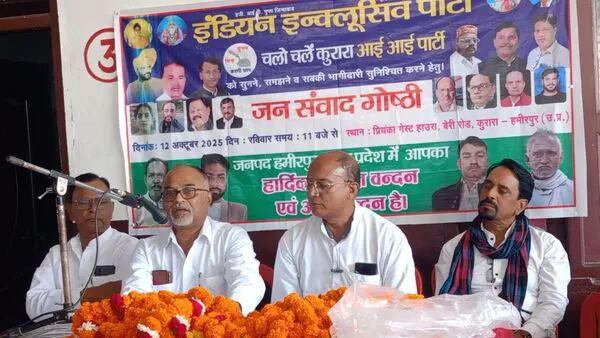
Bihar Elections: A Look At The Rise Of Smaller Caste-Based Parties As INDIA Bloc Inducts Indian Inclusive Party
Two of the seats for the new party, called Indian Inclusive Party (IIP), led by I P Gupta, would likely be given from Congress ' quota, as per media reports.
Gupta released a video message on social media on Friday, where he talked about the seats allocated and said that on these three seats, the party's candidates will contest with the 'karni' symbol.
He spoke of how this was the first political party representing the Tanti-Tatwa and Pan communities.
The Tanti-Tatwa and Pan communities, who are mainly weavers and cloth traders, are usually based in Bihar and several parts of northern India, West Bengal, and Odisha.
How a Supreme Court order led to IIP's first prominent rallyEarlier this year, the Supreme Court had junked the Bihar government's order to move the Tanti-Tatwa-Pan communities from the Extremely Backward Class (EBC) category to the Scheduled Caste category.
The communities were included in the EBC category during the implementation of the Mandal Commission report in 1992.
Also Read | Infosys founders Narayana Murthy, Sudha Murty opt out of Karnataka caste surveyThe Bihar government has also filed a review petition in the Supreme Court regarding the same.
In April, I P Gupta held a rally in Patna to demand the restoration of SC status for the Pan-Tanti communities and launch his party, which was then named the Indian Inqalab Party, later to be rechristened to the Indian Inclusive Party.
Smaller caste groups get voiceThe rise of the IIP can also be seen as the political empowerment of a highly marginalised community which was earlier under the 'Mandal' umbrella.
Such parties are gaining ground in Bihar, and as an extension, in Indian politics. One of the earliest of such examples is the Lok Janshakti Party formed by former Union Minister Ram Vilas Paswan, which sought to represent the fishermen communities of Bihar.
Another party, the Vikassheel Insaan Party founded by Mukesh Sahani also has a base of supporters among the fishermen community of the state.
The Hindustani Awam Morcha, led by Union Minister Jitan Ram Manjhi and a part of the NDA alliance, claims to represent the Mahadalits (a term coined by the Bihar government in 2007 for the poorest groups among the state's Dalit communities.)
Caste-based parties in BiharBIhar has a history of caste-based parties, with the biggest example being the Rashtriya Janata Dal (RJD), which has its support base within the Yadav and the Muslim communities.
Also Read | JDU releases second list of 44 candidates for Bihar Election. Check namesLikewise, the erstwhile Samaata Party established by Nitish Kumar had a support base among the Kurmis, Upendra Kushwaha's Rashtriya Lok Samata Party had a support base comprising Kushwahas or Koeris, and Om Prakash Rajbhar's Suheldev Bharatiya Samaj Party has the backing of the Rajbhar community.
Such political outfits show the urgency caste groups have felt to give their voice a space in the corridors of power in Bihar politics. This also extends to Uttar Pradesh, where Samajwadi Party's support base also comrpises of Yadavs and Muslims while Sonelal Patel's Apna Dal is backed by the Kurmi community in eastern UP.
Legal Disclaimer:
MENAFN provides the
information “as is” without warranty of any kind. We do not accept
any responsibility or liability for the accuracy, content, images,
videos, licenses, completeness, legality, or reliability of the information
contained in this article. If you have any complaints or copyright
issues related to this article, kindly contact the provider above.
Most popular stories
Market Research
- Thinkmarkets Adds Synthetic Indices To Its Product Offering
- Ethereum Startup Agoralend Opens Fresh Fundraise After Oversubscribed $300,000 Round.
- KOR Closes Series B Funding To Accelerate Global Growth
- Wise Wolves Corporation Launches Unified Brand To Power The Next Era Of Cross-Border Finance
- Lombard And Story Partner To Revolutionize Creator Economy Via Bitcoin-Backed Infrastructure
- FBS AI Assistant Helps Traders Skip Market Noise And Focus On Strategy




















Comments
No comment